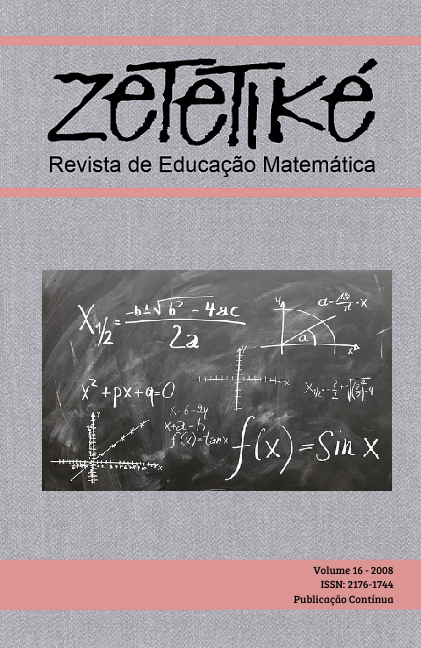Abstract
The reforms initiated in the Spanish educational system attach a
important role to the new Technologies of Information and Communication
(T.I.C.), that they point the obligator education as the space where if must
initiate to constitute the functional use of the technological means. In march of
this reform, the most important is to ask what the value and the role that
teachers attach to the TIC as a resource in the processes of teaching and
learning of the Mathematics in the primary education.
This paper analyzes the results of an experience with four teachers of Primary
Education (Elementary Education Cycle I) from a Public school of Tenerife
(Spain), conducted through meetings with discussions, application of
questionnaire and interviews, which tried to apprehend what these professionals
thought on the proposed reforms. We detach the determinative paper of the
professor, conditioned by their knowledge and beliefs, in the implementation of
the TIC.
References
BARTOLOMÉ, A. Sociedade del conocimiento, sociedad de la información, escuela. In: ALÀS, Anselm et al. Las Tecnologías de la Información y de la comunicación en la escuela. Barcelona: Editorial Graó, 2002.
CLARK, C. Tem Years of Conceptual Development in Research on Teacher Thinking. Paper apresentado na Isatt´s Conference, Tilburg, May. 1985, pp. 28-31.
CLARK, C e YINGER, R. J. Three studies of Teaching planning, East Lansing, Institute for Research on Teaching. Michigan: Michigan State University, 1079. (Research Series, Nº 55)
ELLIOT, J. La investigación - acción en educación. Madrid: Morata, 1990.
KEMMIS, e MCTAGGART. Cómo planificar la investigación-acción. Barcelona: Laertes, 1988.
MINISTERIO DE EDUCACIÓN Y CIENCIAS. Diseño Curricular Base, Educación Primaria, Área de Matemáticas. Madrid: Ministerio de Educación e Ciencias, 1989.
OLSON, J. Teacher influence in the classroom: a context for Understanding Curriculum Translation, Instructional Science, nº 10, 1981, pp. 259-275.
ROCHEBLAVE SPENLE, A.M. La notion de rôle en Psychologie Sociale. Étude historico-critique. Paris: PUF., 1969.
RODRÍGUEZ Gómez, R.G; FLORES, J. G. e JIMÉNEZ, Eduardo G. Metodologias de la Investigación cualitativa. Málaga: Ediciones Aljibe, 1996.
SHAVELSON, R. J. e STERN, P. Research on teachers' pedagogical thoughts, judments, decisions and behavior. In: Review of Educational Research, 51; 1981, pp. 455-498.
SHAVELSON e BORKO, H. Research on teachers´ decision in planning instruction, Educational Horizons, 57, 1979. pp. 183-189.
SOCAS, M. e outros. Desarrollo curricular en Matemática e epistemología del profesor. Tenerife: Universidad de La Laguna, 1999.
PAJARES, M. Teachers’ beliefs and educational research: cleaning up a messy construct, Review of Educational Research. v. 62, nº 3. 1992. pp.307-332.
THOMPSON, A. Teacher's Beliefs and Conceptions: A Synthesis of the Research. In: GROUWS, D. A. Handbook of Research on Mathematics Teaching and Learning. New York: Macmillan, 1992.
TESCH, R. Phenomenological Studies: A Critical Analysis of Their Nature and Procedures. Paper apresentado no Annual Meeting of the AERA, New Orleans, 1984.

This work is licensed under a Creative Commons Attribution-NonCommercial-NoDerivatives 4.0 International License.
Copyright (c) 2014 Zetetiké: Revista de Educação Matemática

